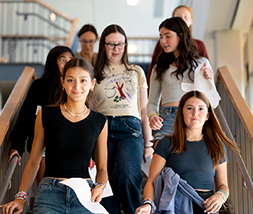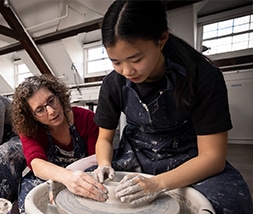Curriculum Guide
History
All Upper School students are required to take two and one-half years of history in Class V through Class VII, including one semester of global studies history in Class VII. All history courses are major courses.
Class V History: Modern Europe and the Problems of Power (1 credit)
In this course we pick up the story of the modern world in the post-Enlightenment period and focus primarily on an expansive Western civilization and the impact—both positive and negative—it has had on the rest of the world. While “the West” has certainly made some impressive contributions—in terms of science and technological innovation, human rights and democratic politics, economic development and material comforts—its legacy is more complicated. Democratic politics and universal rights have competed with fascist and totalitarian forms of government; peace and prosperity have been followed with catastrophic wars; the generation of wealth and material resources is often coupled with worker exploitation and environmental degradation. We assume in this course that appreciating Western civilization and its alternatives is a necessary step toward understanding ourselves.
Class VI History: United States History (1 credit)
The primary aim of this course is to identify and explore the set of ideals and “self-evident” truths that inspired a revolution in the late 18th century, incited the 19th century’s most bloody civil war, and have shaped this nation ever since. Over the course of the year, we will devote specific attention to three ideas at the center of the debates about who we are as a nation. The first is the notion that “all men are created equal;” the second is that humans have the “inalienable” right to liberty; the third is that ours is a government “of the people, by the people, for the people.” During this course, we will focus on a variety of case studies that further illuminate the role of these three ideas at the center of our national debate. A second aim of this course is to use our knowledge and empathy to understand the experiences of a wide variety of social and identity groups in American history. We do this to understand ourselves and to place our own understandings and assumptions about the American experience under scrutiny. The culmination of the course will be the completion of an independent research project focusing on a topic related to US History and connected to one of the course themes.
Class VII Semester 1 Electives
Modern Indian History (0.5 credits, fall)
The history of India spans millennia; scholars often devote lifetimes to the study of the subcontinent. In lieu of a comprehensive exploration of India, this course will concentrate on modern India, starting around 1700. Students will embark on an exploration of the Mughal Empire, its decline, and the subsequent ascension of British India. Our journey will include an in-depth examination of the East India Company and the repercussions of British imperialism on India from multiple perspectives. Students will analyze pivotal events such as the 1857 rebellion and the onset of direct British rule, and the profound, far-reaching consequences of these turning points. Students will also scrutinize the evolution and significance of the Indian National Congress, investigate the rise of Indian nationalism, and assess the roles of influential figures such as Gandhi in the lead up to independence in 1947. Finally, students will consider India’s identity post-independence, and reflect upon the current issues and conflicts—and the historical antecedents—that shape what is now recognized as the world’s largest democracy. This course fulfills the global studies requirement.
Latin American History (0.5 credits, fall)
This course will explore the history of Latin America through the lens of the region’s environment and geography. Rather than assuming that nature is simply there to be discovered, seen, or altered, we will ask how the natural world has been construed, and how assumptions about it shaped social orders, economies, cultures, and history itself. We will spend most of our time on modern Latin America, and will look at a variety of geographical and historical contexts, from Mexico and Cuba to Brazil. Students will be asked to analyze different kinds of texts—maps, archival documents, essays and films—and we will experiment with different investigative techniques and historical methodologies. This course will join with its literature counterpart for an interdisciplinary research project. This course fulfills the global studies requirement.
Native American Studies: Sovereignty, Agency, and, Resistance (0.5 credits, fall)
This course will explore the history of Native American movements and leaders that have defined what it means to be part of the indigenous community as they assert their identity in the United States. The first unit will look at the Great Sioux War as a pivotal moment when Native Americans were faced with the question of what their role would be in post-Civil War America. Focusing on a westward expanding United States, our class will consider how Native Americans have experienced life in the U.S. through compromise, alliance, war, protest, and legal proceedings. In order to examine sovereignty from Native American and non-Native American perspectives, this course will consider current-day events while also providing connections to the historical context for movements that seek to reclaim agency, land, and rights. We will use both contemporary issues and case studies to help us answer questions about how different Native American groups are working to reconcile their history with that of the United States. Ultimately, we will strive to better understand the richness, diversity, and complexity of Native American history in the United States. Class VII students will be given priority for enrollment in this course; however, Class VIII students may enroll, pending its ability to be scheduled.
Class VII Semester 2 Electives
African History (0.5 credits, spring)
Our aim in this course is to balance Africa’s vast and diverse past—which extends as far back as the dawn of mankind—with the events, cultures, and practices that define Africa today. We begin the course with the popular but skewed images of Africa found in much Western history writing and culture. Students are then asked to consider how such ideas have shaped African history, particularly in the colonial and post-colonial periods. In order to reflect the diversity and vibrancy of African culture, history texts are coupled with ethnographic writing and film. The final weeks of the course are dedicated to an investigation of contemporary events and dynamics—which include South Africa’s truth and reconciliation commission, the struggle for democracy and free markets, and Africa’s role on the world stage in the 21st century. This course fulfills the global studies requirement.
History of the Middle East (0.5 credits, spring)
This course is designed to introduce students both to the complex history of the Middle East and to the events and “revolutions” that are shaping the region today. Specific attention is paid to the birth of Islam and its subsequent influence on Middle Eastern culture and politics as well as to the legacy of European colonialism and its role in determining the region’s political boundaries and conflicts. Students will be asked not only to use their knowledge of history to explain contemporary issues facing the region but also to engage in a critical discussion of how our own views (of Islam, of culture in the region) can hinder a full appreciation of the history of the Middle East. This course fulfills the global studies requirement.
Topics in Russian History (0.5 credits, spring)
By the early 20th century, war and revolution ended three centuries of imperial rule in Russia and created the world’s first socialist society. Less than seventy-five years later, the experiment appeared to end in failure, with the implosion of the Soviet Union in December 1991 and the return to an authoritarian state under Vladimir Putin. This course introduces students to the major themes, problems, and events of Russia’s late imperial, Soviet, and post-Soviet history. We begin with Peter the Great’s vision for empire, examining the major themes of westernization and industrialization, and the interplay between reform, rebellion, and revolution in enacting political change. Students will explore the history of the Soviet state and society through the revolutionary turmoil, Stalin’s socio-economic transformations and use of terror, and the Cold War and the role of ideology in policy and everyday life. Finally, we will examine the rule of Vladimir Putin in the broader context of Russia’s history. This course fulfills the global studies requirement.
Genocide in the Modern World (0.5 credits, spring)
This course explores the definitions, prerequisites, warning signs, and various modes of genocide. Students will examine strategies for preventing genocide and evaluate the concept of “justice” in addressing such atrocities. The primary focus of this course will be on global case studies spanning the 20th and 21st centuries, as well as debates concerning the infringement and safeguarding of human rights. Students will learn about the psychological, social, and political functions of scapegoating and communal violence and consider how modern institutions—such as sovereign nation-states, the United Nations, non-governmental organizations (NGOs), and the wider international community—either contribute to or help prevent such outcomes. Through engagement with both secondary source analyses and first-hand accounts, students will develop a comprehensive understanding of the nature of genocide and its immediate and long-term implications for human rights. Class VII students will be given priority for enrollment in this course; however, Class VIII students may enroll, pending its ability to be scheduled.
Class VIII Semester 1 Electives
Macroeconomics AP (0.5 credits, fall)
This course is a college-level introduction to macroeconomics that examines how the national economy functions as a whole. Understanding basic economic concepts is vital in today’s globalized world, and this course will provide students with a solid foundation for further economic studies. The students will develop the skills necessary to become well-informed decision-makers and to apply an “economic way of thinking” to their everyday lives. The course builds on basic concepts to facilitate a broader economic view as we analyze what determines the economic progress and decisions made by policymakers. Students will express their understanding using both written and graphical explanations. This course will prepare students for the AP Macroeconomics exam, which is administered in May (with review sessions running before the test). Open to students in Class VIII.
The Politics of Identity: An Examination of Race, Class and Gender in the 21st Century (0.5 credits, fall)
Race, class, and gender, and the inequalities associated with them, affect all of our lives but often go unexplored or challenged. This discussion-based seminar will examine how the social construction of race, class, and gender affect the political, economic, and social life of the contemporary United States. Through the use of essays and newspaper articles, films, music and literature we will explore how these inequalities shape the individual and collective identity. Throughout the course, the American experience will be compared and contrasted with societies throughout the world. Some of the questions/topics we will explore include “the concept of “race”—fact or fiction?,” “The politics of race relations in the 21st century,” and “What causes poverty?” Each student will develop possible approaches to addressing social inequalities by “taking a stand” on an issue of importance to them and their local community. Open to students in Class VIII.
Class VIII Semester 2 Electives
Empire and Revolution in Southeast Asia (0.5 credits, spring)
This course presents a social history of modern Southeast Asia, with a focus on the experiences of the region’s indigenous inhabitants. Students will briefly delve into the history of the region and its peoples prior to the European “incursion.” Subsequently, students will examine the expansion of colonialism into Southeast Asia, tracing how indigenous populations navigated and responded to the political, social, economic, and environmental transformations introduced by colonial powers. In the final part of the course, students will explore the ways in which Southeast Asians reclaimed not only their lands but also their identities, utilizing various forms of rebellion, ranging from peasant revolts to national revolutions. Readings for the course will encompass both primary and secondary sources, providing insights into early modern Southeast Asian societies, the dynamics of empire, and the indigenous processes of resistance and revolution. Students will emerge from this course with a deeper understanding of the region, the nature of empire, and the agency of Southeast Asians as they confronted the forces of historical change, ultimately shaping a future that continues to define their modern nation-states. Class VIII students will be given priority for enrollment in this course; however, Class VII students may enroll, pending its ability to be scheduled.
The Art of Protest: Social Movements in the United States (0.5 credits, spring)
Throughout time, the arts have been used as a means of documenting history while at the same time participating in its transformation. Following a brief overview of the history of art as an agent for social and political change, the Art of Protest will focus on artwork produced following World War II when the intersection of art and activism becomes a modern trend. We will examine protests in service of social justice looking at the Civil Rights Movement and its legacies, second-wave feminism and #metoo, the gay rights movement and the AIDS crisis. Students will examine a variety of art forms including paintings, sculpture, photographs, cartoons, billboards, graffiti art, public installation art, and social media. Although cultural context, media, and time period will vary, the commonality of the use of the visual arts to attack injustice will provide the common thread. Class VIII students will be given priority for enrollment in this course; however, Class VII students may enroll, pending its ability to be scheduled.





